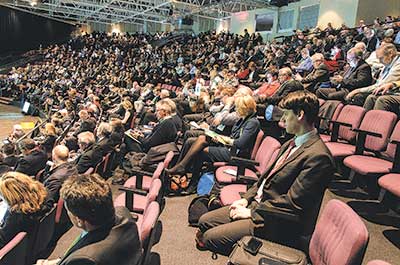Almost 900 delegates from councils across Australia came together in Canberra for the National General Assembly of Local Government (NGA), supporting an urgent motion to highlight the impact the Federal Budget’s removal of Financial Assistance Grants (FAGs) will have on their communities.
Funding was the key issue at the NGA, running with the theme Getting Down to Business, and the first day saw a special urgent motion calling on the Federal Government to restore indexation of FAGs, which was supported by over 800 delegates.
Australian Local Government Association (ALGA) President Mayor Felicity-ann Lewis and Chair of the National General Assembly, said these grants ensure local government is able to provide the services Australian communities need.
“The decision to freeze the indexation of FAGs will impact on the level of local services available to every community across Australia.
“FAGs are a vital source of revenue to local communities.
“They are used to maintain a range of infrastructure including local roads, bridges, parks, swimming pools, libraries and community halls as well as services to the young, the elderly and community groups of all kinds.”
Deputy Prime Minister and minister for Infrastructure and Regional Development Warren Truss said that the pause on the indexisation of FAGs was local government’s part to play in repairing the budget.
“The Financial Assistance Grants program I know is important to local government, and we will provide still $9.3 billion in funding over the four years from 2014 to 2018.
“I know that this will mean that some councils will have to reshape their budgets over the short term, and show some greater level of financial constraint, and we know that expenditure reductions are not the sole answer.
“We must invest in things to make our country strong, and will drive economic growth, and that’s where regions and local communities come into their own. That’s why, in this Budget, we’ve included $2.5 billion for local roads under the Roads to Recovery program, including an extra $350 million under the Infrastructure Growth Package providing double the amount of funding in 2015–16.
“And let me say that we have no delight in these measures, and we don’t wish to prolong stringent measures, and as soon as we can relax them, we will.”
Shadow Minister for Regional Development and Local Government Julie Collins expressed disappointment during her address to congress.
“The feedback I’ve received is that there has been a lot of uncertainty in recent times starting with the Commission of Audit report that proposed the ceasing of $5 billion of tied grants to local and state governments and the abolition of the Australian Council of Local Government and Local Government Ministers’ Forum.
“A week later, the Abbott Government handed down its Budget which did not embrace all of the Commission’s measures, but the Budget did have some nasty surprises in it for local government.
“I am extremely disappointed the Abbott Government decided to freeze the indexation of the Financial Assistance Grants.
“The loss of more than $900 million across the forward estimates will have serious implications on the budgets of local councils.
“Like you, I am disappointed about the government’s failure to consult with you, to recognise the scale of the impact on your bottom line and disproportionate impact on smaller and rural councils.
“Equally concerning is the diminishing affects over time to the funding base of the Financial Assistance Grants if the Abbott Government decides to freeze indexation indefinitely.
“The expectation of the Abbott Government is that you will have to do the same service delivery with less funding.
“For many councils and shires that will be difficult to do.”
Leader of the Australian Greens Senator Christine Milne also addressed the Delegates on day two and was critical of the Abbott budget, stating that local government would no longer be receiving the benefits of environmental funding following the budget.
Senator Milne went on to say that cuts to support to young people, pensioners, people with disabilities and the unemployed are accelerating cycles of poverty which are already straining the resources of some councils.
Bridges renewal fund
Mininster Truss also announced as part of his address that stage one of the Federal Government’s $300 million Bridges Renewal Programme had been launched.
“This fulfils an election commitment that we made not just at the last election, but also the previous election, and will help to renew and replace bridges across the nation.
“We’re calling for proposals from 1 July 2014 from councils and states and territories.
“Round one will focus on projects that are sufficiently advanced that construction can begin in the 2014-’15 financial year.”
Round two is expected to be announced next year, giving councils who are not construction ready time to prepare a proposal.
Budget allocations will also result in a double payment of Roads to Recovery money in 2015–16, an announcement that was met with applause from the delegates in attendance.
Mr Truss also said proposals are being sought for Round Four of the Heavy Vehicle Safety and Productivity Programme.
“Round Four will deliver $40 million each financial year and cover up to 50 percent of the cost of projects that increase productivity for heavy vehicles and improve the safety environment for heavy vehicle drivers.”

















